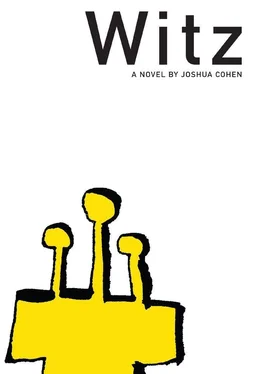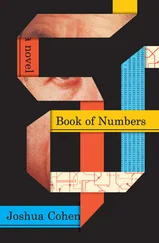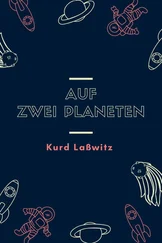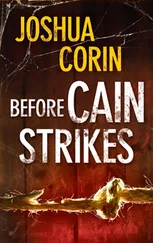A big one, Uncle Samuel had said, and he’s the doctor, the biggest I’ve ever dealt with. Though how she’d known it all better than him and before, having had the experience; but to confirm — wisdom is your own voice and prophecy, that of another — a brother, the eldest brother of her father had said, her stepfather, an observation a second doctor had seconded, this also an uncle of hers, Doctor Solomon, her mother’s brother, her youngest, concurring: ginormous!
After twelve, though, you should be able to handle it, which one had said, handle Him — Mazel Tov to your husband, a son!
She tells Israel everything, she hadn’t told Israel that — she’s thinking, why ruin it?
Hanna washes her heels and she washes her ears and she washes her One True Hair, the twitchy tip of her nose.
In the shower, she hears: the memory of the doctors’ voices, her own voice, and, within the whirlwindy muffle, gathered in the shower, risen to its tiled peak and lost in the steaming, the voices of her kinder; heard indistinct as to speaker or even age, as impossible to differentiate as to enumerate and yet how she tries, to respond, crying for her girls, and — through the halfdim of a hallway below her daughters slowly assemble, dazedly, pulling each other and pushing, teasing at one another, Rubina then Simone trying to act like Rubina detached, removed, behind the rest and mothering, selfconsciously not engaged in this messing around.
One’s holding candlesticks, the other with candles.
As to involve the others in preparations adult and mature and so, also, to calm them, Rubina hands the candlesticks one to Asa the other to Isa, has them place them on the designate sill, then struggles their candles in, melts, waxy dribble, rolls the wicks in her fingers, wicking them as stretched as their wait, longer, just a moment more’s yelled despite there being no yelling, disallowed as it’s almost time: Hanna comes downstairs in a maternity dress, blue for a boy, she thinks, betraying, whitesashed, not the white dress or shift, the mirror and the heads arranged around it in conference had decided against it, shook no then brushed hair, her white kerchief, her scarf the shade of the window opposite her descent with her heels pecking the tile from the last step to the floor, through the kitchen to leave the Rag wrung out in its drawer, shut, then a tug at the handle of the oven’s door to check, that the timer’s been set for tonight and tomorrow, the Shabbos mode back through the hallway toward the diningroom, her daughters.
From the windows looking in with the eye of the moon above, the sun below — who else is looking in in this neighborhood — she’s only a round taken of darkness, they all are, their shadows merging to mother the night.
Hanna smoothes the tablecloth, white, prepared for the taint of tonight — anything to put off the fire.
But Rubina strikes the match, and holds it there, the other sisters holding that hand.
The lights float in darkness, which interpretively is either something in nothing, or its reverse — and then, after the slightest, when no one knows if they’ll make it, the flickers go to life, in blue, in yellowing white; Hanna’s hands in their sweep, and her daughters, they follow: their words, which are hers, coming lower and hushed — though it’s not as if they’re afraid anyone’d hear — their vowels are stretched, wicked, lit on the tips of their tongues; some of the daughters knowing the words only through sound alone, others through the way their tongue feels in a particular mouthspot, the youngest ones just moving their lips in a manner that seems to them serious.
A blessing not of the candles, but of daughters standing at window without fear of fire, warm, and about to be watered and fed: what riches, what wealth of comfort and beauty surrounding; a pair of diamonds without jewelry, unset, these culets blessing them as if worth all the world, saved for their flee only every Friday examined and polished — valuables struck out of sulfur, dug from their holdings in trunks, dispersions like the spreading of flame…how strange, how foreign it feels to be thinking of how to survive, how to exist, to prepare for a future unknown and yet, inevitable — as the candlelights burning are the impurities in the night, it’s impossible not to admit, though the necessary impurities, they have to insist, that that reminds them of that that remains still unfinished, unlit, in need of repairs.
And then the moon, too, an impurity, and the stars — they’ve all come in pairs. Their house, so lit, the world entire. And everything around it, surrounding, forget it. Banished, unto the basement, unfinished. They disperse, the sisters one by one, each of them ten, a hundred almost, or so it appears to Batya, to her own hallway, or room — except hers, soon not to be — heading upstairs, to sit, upstairs-upstairs, lying in wait, peering out over the yard and the drive through their windows that won’t open, God forbid they should fall from; they’re brushing each other’s hair with their mother’s brushes, combs, they’ve had to wait until she’d finished with them. All except Batya, her tears dried to the quality of the glass she’d shattered, these shards from her eyes: our grief burdens, as it’s converted unto the nature of the responsible sin. She’s itchy, she’s scratched up her face and it’s red and hurts awfully. Now she attempts to sit in the livingroom, the familyroom, the den of her father and his animal life: struggling, shvitzy and angry, barely able to get herself up on a sofa, which Israel calls a couch or else Hanna does and Israel a sofa — the fireplace ledge. The candles are shining from just down the hall, and Batya’s thinking if only to herself why this happens every Friday with the sticks and the wicks and her sisters, it’s so together and pleasant and, she doesn’t have the word, the ideas, but why not every night, every day three times with meals and a cookie, a cupcake. Warming, though confused, babied with hope despite the burn of her cheeks. Atop a table of stacked bills, clipped receipts, President Resident, addressees: Mister Hanna, Misses Israel. A book she can’t read that holds prayers her head knows, a siddur. And a bowl of what’s to her fruit. Batya consoling, fists an apple that’s wax, bites, then replaces it, teethmarks first.
Simple enough, he thought: the instructions had been to buy bread, those were the rules, his engagement, the vows.
She asked, buy some challah — ceremonial bread.
For motzi, the cerement of our hunger — the burial in the mouth of the loaves, two of them, one for each language — and how he repeats this to himself, the request’s order, silently but still in the voice of his wife: on your way home, if it’s no trouble, she’d said, no trouble, she’d added, but not a conditional.
Not too much.
Still, it’ll make him later, this stopping here, twenty minutes out of his way and then shul, don’t forget.
She hadn’t baked. She hadn’t baked? There are fish in the sea and chickens in the air, and she hadn’t baked — it’s unnatural, not normal, it’s not like her, what’s wrong. There’s a kid in the womb, flyingthings in flight and things that swim swimmingly, and then what, nothing at all in the oven, the stove, cooling atop the counter, what gives. And so the order, the request as if for his complicity in a shirking that’s only hers if companioned: buy challah, she’d said, don’t forget as I don’t forgive as thoroughly or as quickly as you; after his shower, while he was dressing, suiting, tying his tie, before he left for work in the morning, before work, at work she’d left with Loreta a message she’d left him before she left for home for the day, the week, the year, before early evening, approaching the dark that’s only as constant as him, he’s flattering, as sure as the sun in its nightly crash to the pavement — stopping outside the storefront, the window display, arranging in its reflection his hairs left, wilted weeds like at the trunks rooting the sidewalk landscaped. He browses past the baskets empty of bread so late in the coming — through to his image, thinking an olderyoungish middleaged: hope, there’s still a little crust left for me yet.
Читать дальше












